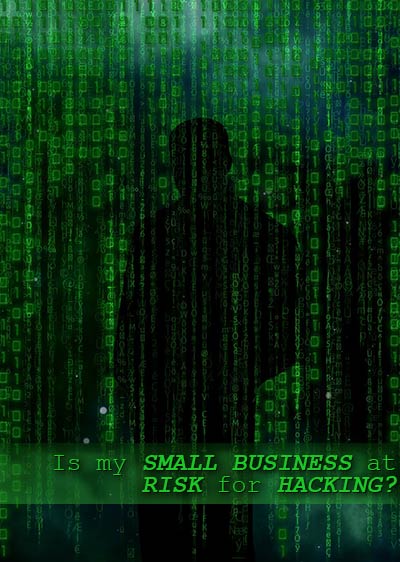With recent high profile hacks such as Target, Ashley Madison, and others, you’ve likely considered a scenario where your small business gets hacked. Let’s be honest though, shouldn’t a prudent hacker target a larger business that has more to lose?
The answer to that question is relative, yet the thinking behind the question itself is flawed. The fact of the matter is: You are at risk because you are a small business.
According to a survey conducted by the National Small Business Association, as many as 44% of small businesses have been hacked with the damages totaling around $8,700 per incident.
 Personal Data Possesses Value in the Black Hat Hacking World
Personal Data Possesses Value in the Black Hat Hacking World
In the world of black hat hackers, personal data is like a currency that can be exchanged as a commodity and eventually converted into cash. Hackers are looking for personal identifiable information (PII) that can be used to gain access to personal bank accounts and lines of credit.
As a small business, you must take proper precautions in order to prevent a data leak and must block hackers from accessing the sensitive information on your network. If a nefarious entity somehow does gain access to your network, it is imperative that you keep your data encrypted so that it becomes useless in the event of a heist.
Top 5 Ways to Ensure Safety Against Hackers
There are simple precautions that you can take on your network in order to protect your business. Here are a few tips that will help keep hackers on the perimeters of your systems:
- Become Vigilant in Warning Your Users: You may begin to sound like a broken record, but always remind your end users of the dangers associated with websites and emails that ask for sensitive information like usernames, passwords, and credit card information. They should never hand out any of this information to third parties, and employees should receive constant training on these security policies.
- Enforce Virus and Anti-Malware Software, as well as Updates and Scans: Always ensure that your systems are equipped with the latest antivirus and antimalware software. Most protection software suites possess advanced options that will automatically update your definition files, keeping you safe against the latest threats.
- Use Both Software and Hardware Firewalls: A firewall is a network security infrastructure that monitors network traffic. Many firewalls come preconfigured with definitions that deflect malicious attacks. Windows has a firewall built into its platform; this software firewall should be configured at the desktop level, only allowing trusted programs to communicate on your network. Hardware firewalls are used for external traffic that traverses over the WAN. A hardware firewall can be configured to keep your network safe against viruses, botnets, denial of service attacks, and more. More importantly, a firewall can prevent an unauthorized intruder from accessing your network, thus making a firewall appliance an essential part of your small business security strategy.
- Secure Your Login Procedures: Do you deploy laptops to your end users? You should always encrypt every hard drive in your mobile fleet using a utility such as BitLocker. Make sure you have a secure login procedure for your user accounts, service accounts, and websites so you can ensure that only credentialed employees have access to the proper resources. It is also important to train your employees on the dangers of giving out sensitive information. Other important training consists of:
- Sensitive data handling procedures
- The importance of a complex password
- Email phishing awareness
- Social engineering awareness
- Still Worried? Consider Cyber Insurance: Let’s be honest. If there’s a will, there’s a way. Zero day attacks are found every day and it may not be possible to completely guarantee the security of your network. With Cyber Insurance, your business can buy an insurance policy in the event your business falls victim to a cyber-attack. When you shop for a cyber insurance policy, you should ensure that the policy covers the costs associated with data recovery and legal expenses incurred by the potential attack.
By incorporating these 5 strategies into your small business, you’ll be able to mitigate many of the most common attacks. If your business does suffer damages as a result of cyber attacks, having processes and procedures in place will allow you to rapidly guide your organization back into operation.
If you have any worries about your network security, please call us at (833) 482-6435, or click the banner below to schedule an IT security audit for your Greenville, SC or Atlanta, GA area business so we can find the best security solutions for you. Preparation for threats like this is a small cost compared to repairing the damage of an actual infection.
If you enjoyed this IT Support article, please check out other posts on our blog and join us on Facebook, Twitter, LinkedIn, and Google+ to see how else we can help your Greenville, SC or Atlanta, GA area business succeed!

 Personal Data Possesses Value in the Black Hat Hacking World
Personal Data Possesses Value in the Black Hat Hacking World